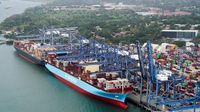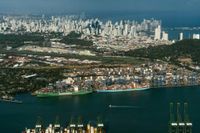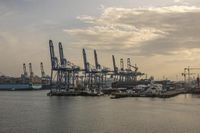CK Hutchison Holdings Ltd., a Hong Kong-based conglomerate, is facing mounting political pressure as it considers delaying the signing of a deal to sell its two Panama Canal ports to a consortium led by BlackRock. Originally targeted for completion by April 2, 2025, the deal is now uncertain as the companies involved require more time to finalize formalities, including due diligence.
The sale, which involves the ports of Balboa and Cristobal, was initially announced earlier this month and is part of a broader agreement that includes the acquisition of 90 percent of Panama Ports Company (PPC) and 80 percent of CK Hutchison's interest in 43 ports across 23 countries. If completed, this transaction could generate over $19 billion in cash for CK Hutchison, which has operated the Panama facilities since 1998 and secured a 25-year extension in 2021.
However, the deal has not been without controversy. Ta Kung Pao, a prominent Chinese-language newspaper, has criticized CK Hutchison's decision to sell, labeling it a "betrayal of all Chinese people" and an act of "spineless grovelling." Former chief executive Leung Chun-ying questioned, "Do merchants have no motherland?" This sentiment reflects a growing concern among some Chinese officials regarding foreign ownership of strategic assets.
In a twist, the Chinese government has announced an antitrust review of the deal, citing the need to protect fair competition and safeguard public interests. This review comes amid fears that the sale could undermine China's Belt and Road initiative, which aims to enhance global trade connectivity through infrastructure investments. Critics of the initiative argue that it is a means for China to extend its influence over vital trade routes.
As the debate rages on, the implications of the sale extend beyond business interests. The political ramifications are significant, as they touch on national security concerns. The national security law in Hong Kong has raised questions about the potential for foreign entities to control critical infrastructure. The law defines several offenses, including collusion with foreign forces, but it remains unclear whether the sale of the ports would fall under these definitions.
Proponents of the deal argue that ownership of the two ports does not confer any power over the Panama Canal itself, which remains under the control of the Panamanian government. The ports are primarily focused on handling Panama's own imports and exports, rather than serving as strategic military or logistical assets for China.
As discussions continue, the potential delay in finalizing the agreement has left many wondering about the future of CK Hutchison's international operations. The company has expressed a desire to exit the overseas ports business while maintaining control of its operations in Hong Kong and mainland China.
In the face of this uncertainty, the response from the business community has been mixed. Some industry analysts see the sale as a necessary step for CK Hutchison to adapt to changing global trade dynamics, while others view it as a capitulation to political pressures from Beijing.
As the April 2 deadline approaches, the stakes are high for all parties involved. The outcome of this deal could set a precedent for future foreign investments in China and the broader region, especially as geopolitical tensions continue to rise.
In conclusion, the situation surrounding CK Hutchison's port sale highlights the complex interplay between business interests and political pressures in today's global economy. Whether the deal proceeds or faces further delays, it will undoubtedly have lasting implications for international trade and investment in the region.







